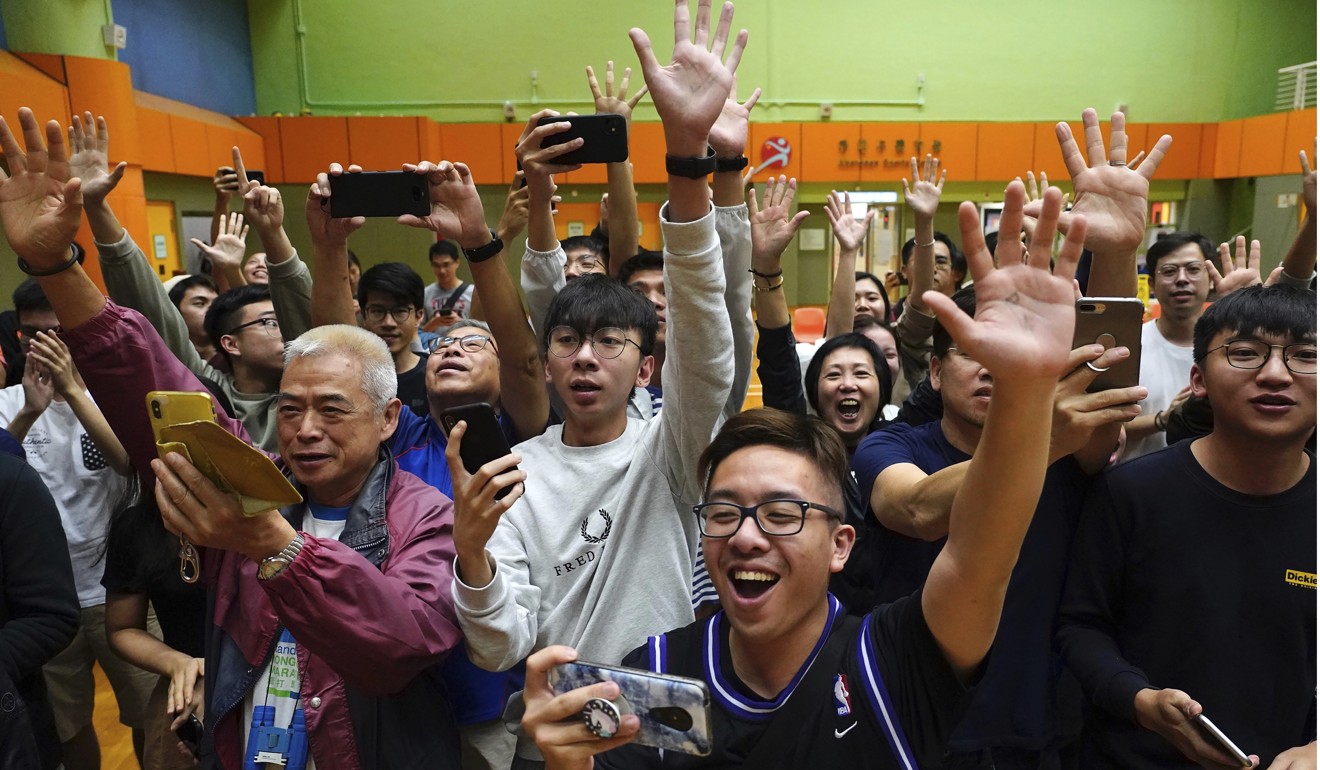
Hong Kong elections: why victorious opposition camp has to keep wary eye on swing voters – and has no room for complacency despite massive haul of seats
- Bigger vote share has helped pan-democrats bag disproportionately high number of seats because of the ‘first-past-the post’ system
- That said, there is no denying the huge number of seats the bloc now controls gives it enormous advantages
Poll watchers pointed out that while the pro-democracy bloc won 86 per cent of the 452 seats up for grabs across the city, their share of the votes was not as stunningly huge as the proportion of seats they swept suggested. The bloc garnered a total of 1.6 million votes, or 55 per cent of the valid votes cast; while the pro-establishment camp got 1.2 million votes, or 41 per cent. The remaining 4 per cent went to the non-affiliated independents.
In the 2015 district council polls, the average share of votes garnered by pan-democrats in the constituencies they contested was 47 per cent. They won 116 seats, compared with 292 grabbed by the pro-establishment camp that year. Thus, on Sunday, the pan-democrats gained from an 8 percentage point swing in their favour, as more moderate voters or fence-sitters who sometimes could be classified as mildly blue, the colour assigned to the pro-establishment camp, or mildly yellow, the pro-democracy bloc, batted for them.
But under the first-past-the-post voting system adopted for district council elections, the bigger vote share translated into the disproportionately high number of seats bagged by the bloc that contributed to the immediate sense of accomplishment.
Former transport and housing minister Anthony Cheung Bing-leung noted the magnifying effect of the first-past-the-post system.
“Public sentiment is actually not that one-sided as the election results indicated. From Beijing’s perspective, it need not spell the end of the world although there is cause for concern,” said Cheung, who is also a political scientist.
Beijing must reassess Hong Kong as pro-democracy camp wins big, say analysts
Over the years, in deeply divided Hong Kong, the pan-democrats used to get roughly 55 to 60 per cent of the total vote share.
In the 2016 Legislative Council election, the pan-democratic camp and localist groups garnered 54.8 per cent of about 2.2 million valid votes cast in the five geographical constituencies.

The 54.8 per cent figure is marginally smaller than the 55 per cent vote share the bloc obtained in Sunday’s polls, suggesting the camp solidified its gains of 2016.
Even if swing voters were responsible for tipping the scales for the pro-democracy bloc on Sunday and could one day be enticed away from them, there is no denying the huge number of seats the bloc now controls gives the camp enormous advantages.
With new resources at its disposal, the pro-democracy bloc can grow its base in the 17 out of 18 district councils it controls by crafting programmes on the ground to win over more supporters.
The challenge is not to squander the gains, like the camp did in 2003 when it did not perform on the ground, analysts said.
Will election win make pan-democrats the kingmakers of next Hong Kong leader?
The losses the party sustained were reminiscent of those it faced in 2003. Back then, only 62 out of 206 candidates won from the staunchly pro-Beijing party. That came after half a million people took to the streets to oppose the proposal to enact national security laws under Article 23 of the Basic Law. The devastating results prompted the resignation of party chairman Jasper Tsang Yok-sing.
Closer scrutiny of the results of pro-establishment bigwigs who were among the biggest losers in their respective constituencies showed they clinched more absolute votes than they did four years ago. But they could not fight against the tsunami of disaffection. Even spoilers joining the race did not dilute the momentum for the opposition.

Horace Cheung Kwok-kwan, DAB lawmaker and an executive councillor, won 2,494 votes in Sai Wan constituency in Central and Western district, 400 more than in 2015 but his vote share fell from 51 per cent to 43 per cent. Cheung was defeated on Sunday by pan-democrat Pang Ka-ho who won 3,289 votes.
Similarly, Cheung’s fellow DAB legislator, Holden Chow Ho-ding, was returned in Tung Chung South constituency in Islands district with 2,161 votes in 2015. He garnered nearly an additional 1,500 votes to clinch 3,619 votes on Sunday. But he still lost to pan-democrat Wong Chun-yeung who won 5,049 votes in a four-man race.
Political commentator and University of Hong Kong academic Max Wong Wai-lun said many high-profile incumbent pro-establishment district councillors lost their seats simply because their rivals had momentum, and their track record on livelihood issues mattered less than political issues of the day.
“DAB candidates like Holden Chow fared better this time but he was swept aside by the tsunami of popular discontent. Their defeats do not mean the pro-establishment camp is losing its usual level of public support at the grass-roots level,” Wong said.

Some observers noted there was a gap between the pan-democrats’ share of popular votes and the level of public support for demonstrators’ key demands in recent anti-government protests.
A poll from July 24 to July 26 by the Hong Kong Public Opinion Research Institute found that nearly 80 per cent of 1,007 respondents supported an independent inquiry into police actions during protests.
According to the findings of rolling surveys released by the institute on November 15, 80 per cent supported the appointment of a commission of inquiry into police’s use of force while 83 per cent believed the government should be responsible for an escalation of violence. The institute is headed by former HKU pollster Robert Chung Ting-yiu.
About 300 people were polled every day since the rolling survey started earlier this month.

Max Wong said some people’s opposition to alleged police brutality did not necessarily translate into support for pan-democrats.
“I don’t rule out the possibility that some voters who are unhappy with police brutality chose to vote for pro-establishment incumbents because of their proven district work, rather than a political novice with no track record in their constituency,” he said.
The festering social unrest has entered its sixth month with no end in sight and the city remains on edge following recent weeks of especially violent protests that saw several university campuses transformed into battlefields as radicals hurled petrol bombs and shot flaming arrows while police responded with tear gas and rubber bullets.
“Some voters who are discontented with the government and police may be scared by such horrific scenes,” Wong said.
But any such disenchantment was also cancelled out by a major win of the pan-democratic camp in securing its base, in the form of the passage of the Hong Kong Human Rights and Democracy Act by the United States Congress last week.
“But passage of the act gave a timely boost to the supporters of the pan-democratic camp,” he said.
In the end, despite the pro-establishment camp and government’s expectations that their campaign against violence would move some voters, it did not pan out. Discontent towards the government was probably the bigger factor for swing voters than disgust over the violence.
Hong Kong’s crushed pro-government camp faces up to new challenges
Anthony Cheung said Beijing and the Hong Kong government were also not so naive to believe that they could turn the tide of public opinion because of the violence of the recent weeks. “I think they have been prepared for the outcome of the pro-establishment camp’s defeat in the elections but they may not have expected such a humiliating drubbing.”
The pro-establishment camp is bracing for hard times following Sunday’s crushing defeat. Councillors receive a monthly pay of HK$33,950 (US$4,330) plus monthly operating expenses reimbursement of HK$44,816.
The loss of 232 seats means the camp will lose financial resources of HK$18.27 million per month.
“It will deal a serious blow to our services at the grass-roots level and nurturing of young blood,” said Kin Hung Kam-in, a DAB incumbent who lost his seat in Po Tat constituency in Kwun Tong.

A former DAB district councillor, who spoke on condition of anonymity, said the defeats of rising stars such as Horace Cheung and Alice Mak Mei-kuen, a lawmaker from the Federation of Trade Unions, would upset the succession plan of the pro-establishment camp.
Anthony Cheung, a former Democratic Party vice-chairman, said the pan-democrats had no room for complacency after tasting victory.
“Responsibility comes with power. The opposition politicians have to show how they can make their local communities better in the district councils in which they command a majority,” he said. “They still have to work with government departments to make things happen.”
Max Wong said the DAB staged a strong comeback in the 2007 district council elections after some pan-democrats failed to impress residents in the constituencies they won four years earlier. In short, swing voters can have an outsize influence in politics.
Additional reporting by Kathleen Magramo

